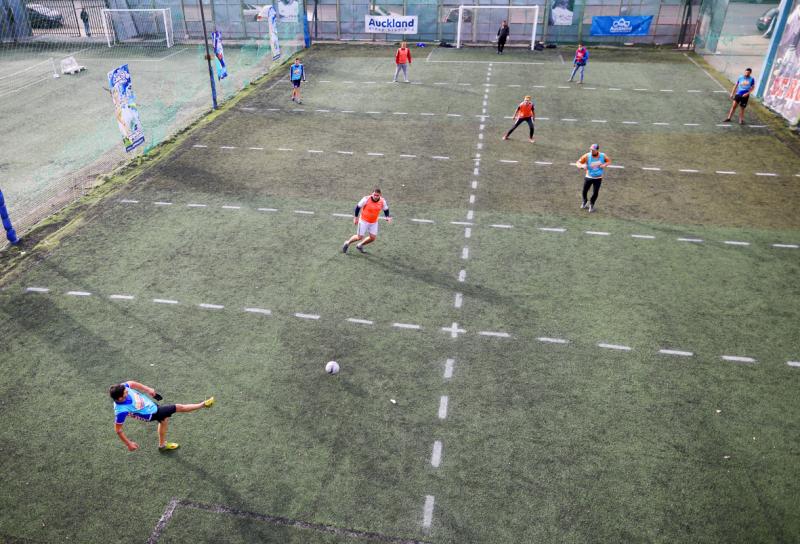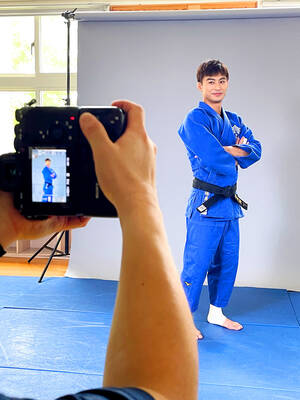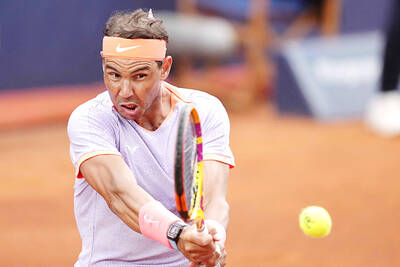Soccer-starved Argentines have found a way to play their beloved sport while social distancing, although the rules have been altered and the dazzling end-to-end dashes produced by national legend Diego Maradona are impossible.
Dubbed “metegol humano,” or “human foosball,” the system designed for the COVID-19 pandemic involves dividing the field with white chalk into 12 rectangles and restricting each player to a defined space. The ball can be passed across rectangles and players can dribble inside their areas. The modified game emphasizes passing and shooting over running and fancy footwork. And of course there are no rough tackles.
Members of Vende Humo and Los Mismos de Siempre on Wednesday tried the new form of soccer at the Play Futbol 5 sports complex in the city of Pergamino, about 240km from the capital, Buenos Aires.

Photo: AP
The amateur players concentrated on not stepping over the lines as they dribbled and defended. Leaving one’s rectangle incurs a penalty.
They agreed it was great to be playing again after a 100-day drought. Professional soccer is suspended and players cannot train. For amateurs who usually rent fields for games, it was like breathing again.
“Now I feel free and happy, getting together again with friends and playing soccer,” said Martin Rodriguez, a defender from Vende Humo. “If it were up to me, I would do this from Monday to Monday.”
A week ago, Pergamino became the first place to test the new game, which has just five players on each team, instead of the traditional 11. That allows games to be played within the framework of Argentina’s quarantine, which allows outdoor activities with up to 10 people.
Rodriguez said he is adapting to the changes.
“It is about paying attention and keeping the distance the game allows us. We have to know how far we can go. We cannot go over the line,” he said.
Players acknowledge that some of the magic is missing, particularly the game’s friction, the “in the ear” trash talk and the kicks followed by apologies, but the point of the new system is to keep a distance.
Gustavo Ciuffo, owner of the Play Futbol 5 complex, devised the new game, which has been replicated in recent days in other parts of Argentina, a soccer-mad nation that produced Barcelona megastar Lionel Messi as well as Maradona.
Ciuffo took advantage of Pergamino’s low infection rate, which let the city enter a looser phase of the quarantine imposed on March 20. Authorities in Pergamino authorized the sport on Friday last week and a game started the next day.
Ciuffo said he was happy to have found a solution “at a very hard time,” when the lockdown exacerbated the country’s economic crisis and demoralized so many Argentines.
Getting the ball rolling again was the best antidote to depression, he said.
“Soccer for Argentines is as important as mate,” the country’s traditional tea-like beverage, he said.

Revelations of positive doping tests for nearly two dozen Chinese swimmers that went unpunished sparked an intense flurry of accusations and legal threats between the World Anti-Doping Agency (WADA) and the head of the US drug-fighting organization, who has long been one of WADA’s fiercest critics. WADA on Saturday said it was turning to legal counsel to address a statement released by US Anti-Doping Agency (USADA) CEO Travis Tygart, who said WADA and anti-doping authorities in China swept positive tests “under the carpet by failing to fairly and evenly follow the global rules that apply to everyone else in the world.” The

Taiwanese judoka Yang Yung-wei on Saturday won silver in the men’s under-60kg category at the Asian Judo Championships in Hong Kong. Nicknamed the “judo heartthrob” in Taiwan, the Olympic silver-medalist missed out on his first Asian Championships gold when he lost to Japanese judoka Taiki Nakamura in the finals. Yang defeated three opponents on Saturday to reach the final after receiving a bye through the round of 32. He first topped Laotian Soukphaxay Sithisane in the round of 16 with two seoi nage (over-the-shoulder throws), then ousted Indian Vijay Kumar Yadav in the quarter-finals with his signature ude hishigi sankaku gatame (triangular armlock). He

Rafael Nadal on Wednesday said the upcoming French Open would be the moment to “give everything and die” on the court after his comeback from injury in Barcelona was curtailed by Alex de Minaur. The 22-time Grand Slam title winner, back playing this week after three months on the sidelines, battled well, but eventually crumbled 7-5, 6-1 against the world No. 11 from Australia in the second round. Nadal, 37, who missed virtually all of last season, is hoping to compete at the French Open next month where he is the record 14-time champion. The Spaniard said the clash with De Minaur was

RALLY: It was only the second time the Taiwanese has partnered with Kudermetova, and the match seemed tight until they won seven points in a row to take the last set 10-2 Taiwan’s Chan Hao-ching and Russia’s Veronika Kudermetova on Sunday won the Porsche Tennis Grand Prix women’s doubles final in Stuttgart, Germany. The pair defeated Norway’s Ulrikke Eikeri and Estonia’s Ingrid Neel 4-6, 6-3, 10-2 in a tightly contested match at the WTA 500 tournament. Chan and Kudermetova fell 4-6 in the first set after having their serve broken three times, although they played increasingly well. They fought back in the second set and managed to break their opponents’ serve in the eighth game to triumph 6-3. In the tiebreaker, Chan and Kudermetova took a 3-0 lead before their opponents clawed back two points, but